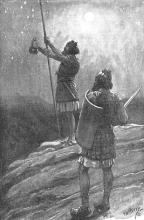A common literary convention in the texts of the Torah is to juxtapose two seemingly unrelated stories that reflect the same values. One is usually a small, individual case and the other a large, "main arc" story on the same subject. This method is a lot like legal precedent. By reviewing an individual case that would be very relatable to common people and then showing how it's similar to a larger idea, these stories denote a worldview that includes a universal system of justice. What's right and good for the small is also right and good for the royal. Toward the end of First Samuel, just such a device is employed to teach a lesson about protection and responsibility.
Chapter 25 opens with a brief mention of the death of Samuel. It is assumed that he died of natural causes related to his advanced age and he is mourned throughout Israel. This doesn't mean Samuel is out of the story, though. His spirit will appear later in David's story, just not any time soon. Chapter 25 is much more concerned with David's confrontation with a man named Naval.
These passages go to great lengths to convince us that Naval is an unpleasant fellow. His name basically means "fool" and he is described as coming from the house of Caleb, or Calibi, which itself is a play on words. Calibi shares a shoresh, a noun root, with the word kelev, or "dog". Naval is a drunk, is cruel to his wife and is greedy. David arrives at Naval's home with the utmost courtesy asking for payment for protective services his men provided to Naval's workers while they were shearing sheep in Carmel. Naval refuses to pay and David is prepared to attack him for the slight.
It should be noted that David isn't extorting Naval. The workers would have been in danger of the Philistine raiders who have played a prominent role in the story. David may have even lost men in their defense. Asking for payment, especially from a man as opulently wealthy as Naval, is only proper. Before David marches against Naval, his wife Abigail sneaks down to David to sway him. She articulately convinces David not to be violent, that if Naval has done wrong it will be for God to judge him. Indeed God does. A mere week after David leaves, Naval suffers a heart attack and dies. Abigail, for her kindness, becomes David's wife after Saul gives Michal to another man.
The story that follows Naval's is the final confrontation between David and Saul. It is the famous tale of how David sneaks into Saul's war camp and steals his spear and water bag while he sleeps. The next day, David stands on a hill holding the spear and calls down to Avner, Saul's second in command and his main protector. David taunts Avner for failing to protect his king through the night. When Saul hears this, he makes it known that he will stop pursuing David.
This scene is merely a more public version of what happened at En-Gedi. Essentially, the deal brokered in secret must play out in front of the entire nation. But just because Saul said he wouldn't chase David doesn't mean the two men were reconciled. David flees into Gath and never sees Saul again. David's story retains this tragic arc. It's a cautionary tale in most cases. The stories in chapters 25 and 26 are about the ways we protect the ones we love. David is a protector of the common people, as with Naval's workers, but he harbors a real wrath for the wealthy. Abigail protects her husband just as Michal protected David earlier in the story, if only because they both wanted to stop all the incessant bloodshed of their era. And Avner, whose job was to protect Saul, failed in his task utterly.
It's telling that none of these protectors succeeded entirely. Only Abigail managed to save Naval's underlings, who David promised to kill. She couldn't save Naval, though. We must remember that these are stories that come from a culture that was dominated, that was not protected from harm. They expressed their disillusionment in the books of Samuel.
